Be quiet! Dark Elite Pro
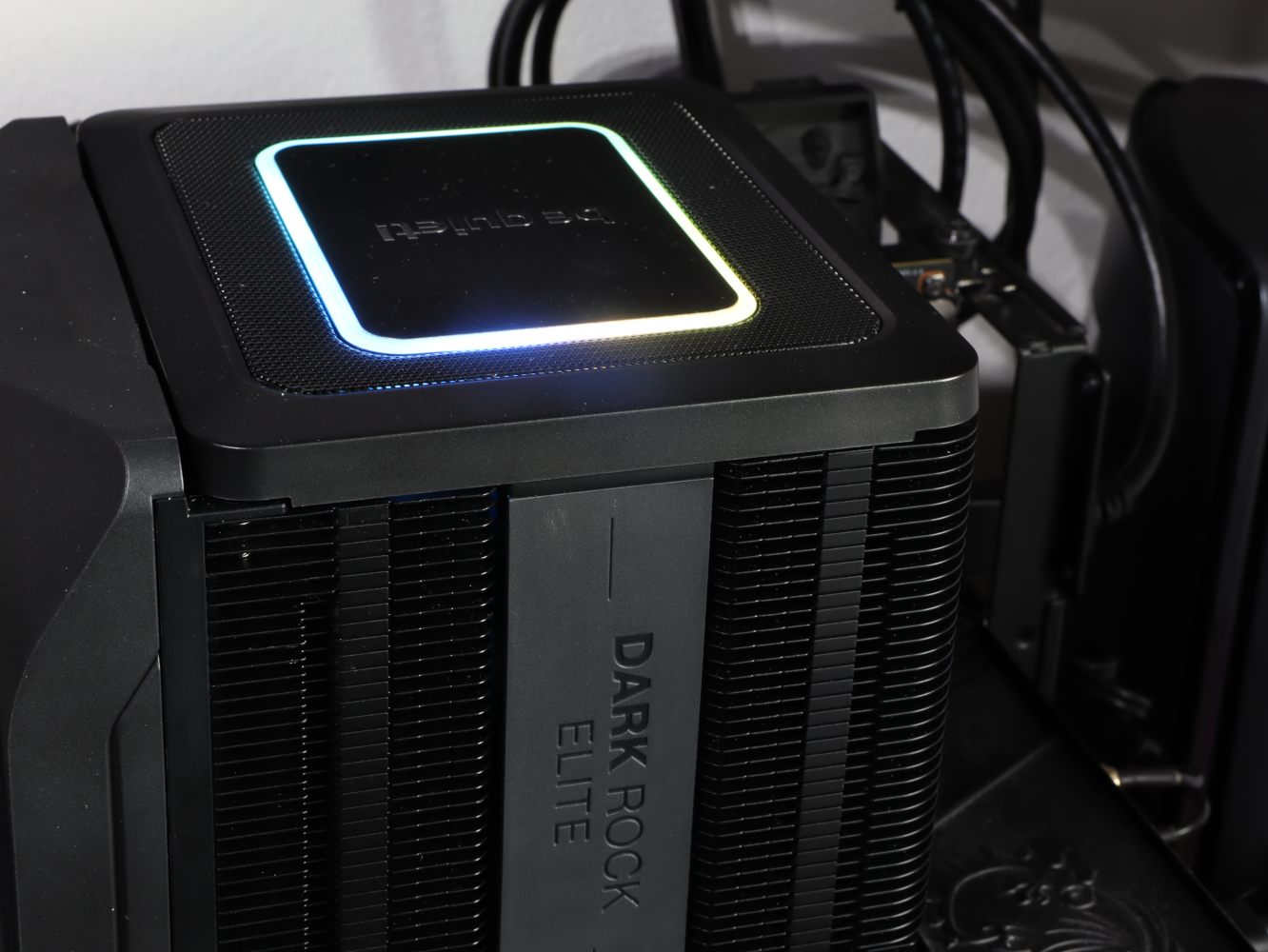
Before we have a closer look at the Dark Rock Elite from be quiet! I found the specifications from their website.
The technical specifications:
- Intel Socket: 115X, 1200, 1700
- AMD Socket: AM4, AM5
- Fan Size: 135mm x 135mm x 25mm
- Fan Speed (100%): 1500/2000 rpm
- Noise Level (100%): 25.8 dBA
- Heat pipe: 7
- Base material: Aluminum
- Connector: 4-pin PWM
- TDP: 280W
- Size & Weight
- (L x W x H) 145 x 136 x 168
- 1.34 kg
About Dark Rock Elite
As I said, the Dark Rock Elite is a 280W TDP cooler. This means that it can be included, even on the more demanding systems, where the CPU will quickly generate a lot of heat. It comes with 7 high performance heat pipes and two Silent Wings which provide high performance and low noise.
If we take a look at the contents, we have, in addition to the tower itself, two 135mm Silent wing fans, mounting kits for both AMD and Intel, screwdrivers and manuals.
The Dark Rock Elite uses two 135mm PWM Silent Wing fans. Which ensure maximum air flow and with an incredibly low noise level. Dark Rock Elite has a button to be able to set between two programs, "Quiet", which sets the fans to 1500 RPM and "Performance", which boosts the fans to 2000 RPM.
The tower is built with four heat pipes, which go from a heatsink at the bottom to one at the top, and between the plate that touches the CPU. Aluminum is used for the tower, as well as a special black coating, with ceramic particles, to ensure that the heat can still escape, and you get an elegant look. The base plate itself is nickel-plated, which also makes it compatible with liquid metal cooling paste, to achieve even better cooling.
Assembly
For the Dark Rock Elite, there is mounting for Intel and AMD, but only mounting for AM4 and the new AM5, on the AMD side. As well as Intel is also cut down to be from LGA115x up to LGA1700. We must start by gathering screws on the bracket, which must sit on the back of the motherboard.
Next, we need to have screws between the motherboards to secure the bracket to the motherboard, as well as mount the bracket that will hold the tower.
Subsequently, two elongated brackets are placed along the CPU, on which the tower must be mounted. The screws from the tower are fixed, and must then be lowered over the CPU.
Finally, the fan is mounted in the desired direction. By default, the fans are set to blow the air to the left, and thereby out of the cabinet.
The Test – Use and Performance
Test system
- MSI MEG Z690 Unify
- Intel I7 12900K
- Nvidia RTX 2080 Ti
- 32 GB HyperX Fury DDR5 5200 MHz CL36
- Samsung 970 EVO 500 GB SSD
Test software
- Cinebench (Benchmark)
- HWinfo64 (Monitoring)
Procedure
The test is set up so that we first warm up the system with Cinebench for 5 minutes. Then run it further for 10 minutes where we measure the average temperature in HWiNFO64. We then finally subtract the room temperature at the given time and land on a delta temperature to give as neutral a picture as possible. The fans are set to run at full speed, so that you get a picture of the maximum cooling performance with the load we are now giving it. It should give a real picture of how much you can stress on the various coolers, and whether they can take more or less than what we give it.
**After following up a bit on the I9 12900K and heat generation, I have chosen to turn off Hyper-Threading, to give the cooler the opportunity to show what it can do, rather than pushing the CPU to its maximum. All tests in the future will run like this.
The measurements:
- Room temperature: ~ 22 degrees
- Fan speed: ~ 2000 RPM
- CPU WATTS: ~ 210
Although the Dark Rock Elite could, in theory, easily cope with more power being opened up at 12900K, I have still chosen to keep it at the same settings as previous tests. It also comes with a nice start, where it hits a delta temperature of 4 degrees. Which is close to many of the other similar models, such as the MA824 Stealth.
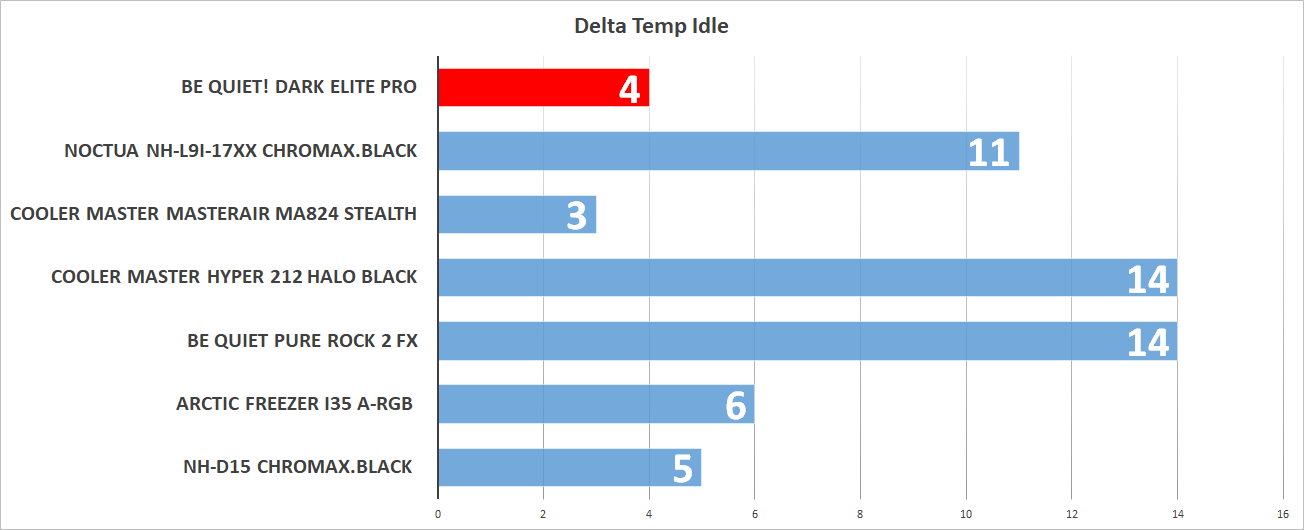
It is only now that we can really see if the Dark Rock Elite can keep up or if it succumbs, like many other coolers. Here, however, we get a nice result of 59 degrees in delta temperature. Only surpassed by the MA848 Stealth. I didn't feel the cooler was under pressure and it very quickly created a stable temperature during the test, pushing the CPU up to 210W during the test.
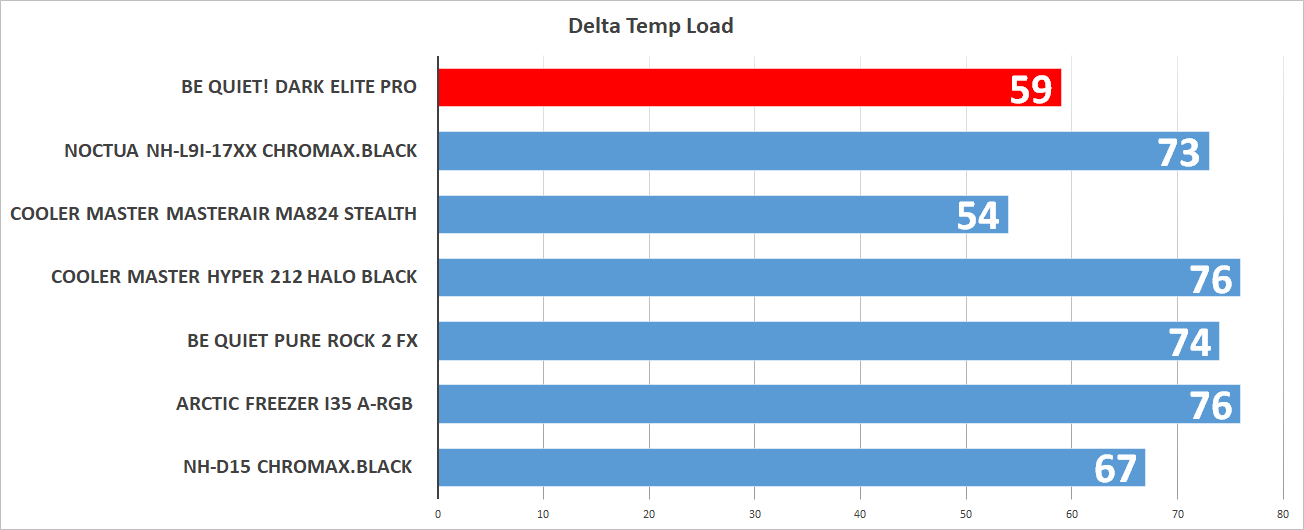
Noise level
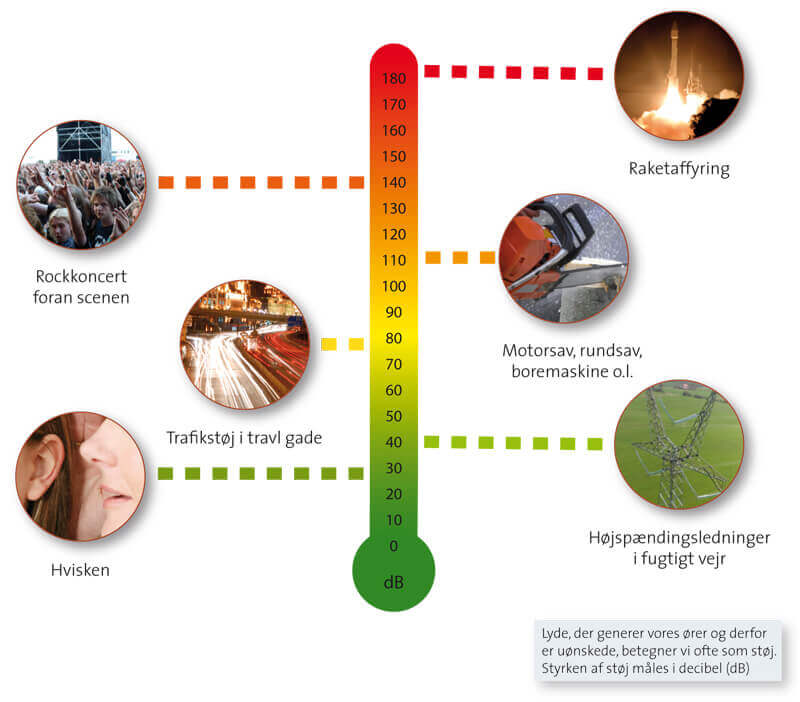
Our noise measurements were made with a UNI-T UT353 dB meter. The measurements were made in a "real world" setup and therefore not in a sound chamber. External influences have of course been tried to be reduced as much as possible but, as I said, not done in a sound chamber. Our measurements must therefore most of all be taken as a general indicator and not a scientific measurement. They primarily serve as a basis for comparison across tested products, which are always tested under as comparable conditions as possible.
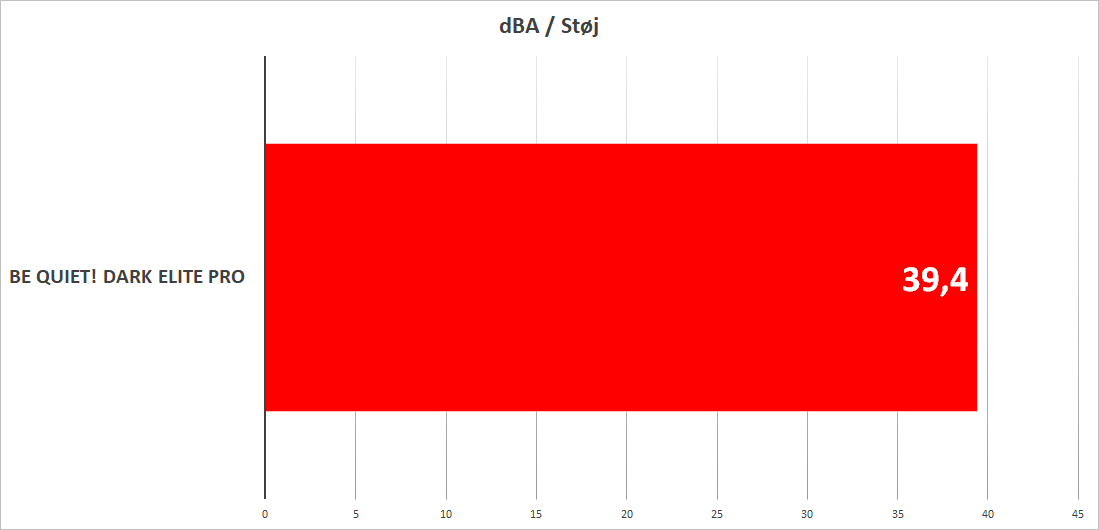
Price
Since the Dark Rock Elite has not been launched in some stores during the test, it has not been possible to find a price. However, I have been informed by be quiet! about an MSRP of €114.90, which is equivalent to 140$.
 Do you want to find more information about Dark Rock Elite from be quiet! you can click on the banner.
Do you want to find more information about Dark Rock Elite from be quiet! you can click on the banner.
Conclusion
We have come to the end of the Dark Rock Elite test. We can safely say that we did not pressure either the cooler or the CPU during this test, but it also shows that the Dark Rock Elite has much more to offer if you have a slightly more demanding system and want to use an air cooler. Although it did not manage to come up with the lowest measurement, it was still very close.
The assembly itself with be quiet! is always easy and straightforward and as long as they don't change that part I'm not going to complain.
The noise level itself is at a nice level. I did not experience the noisy one, and it is as we know it from be quiet!. However, it wasn't because it was completely silent either. This could of course have been changed with "Quiet" mode, where all tests were done in "Performance" mode.
It shares many design choices with the Dark Rock Pro, where, among other things, they have chosen to add a little RGB on top. The actual connection of the two fans together with the RGB only takes one plug, as they have managed to make a joint that works really well, and also does not create a lot of cable clutter.
Although we have not received the final price, other than MSRP, it is still reasonable, where it is close to similar high performance air coolers. It also means that the price will not be a decisive factor whether you want to take this one over another.
I conclude the test by giving the Dark Rock Elite a score of 9 out of 10, along with the Great Product award. It is of course an air cooler aimed at those who want the system to be well cooled and where the requirements for a fan are a little higher. It's not because it's a cooler where you can throw it on the really big CPUs and expect it to keep the system cool, but it can undoubtedly do the job better than many others.
Pros
- Easy to install
- low noise level
- No software
- Neutral black design
- Performance
- Price
Cons
- Fills up quite a bit
Score: 9 + Great Product


Latest air cooling
-
24 Junair cooling
-
11 Marair cooling
be quiet! Pure Rock Pro 3
-
11 Febair cooling
be quiet! Silent Loop 3 360
-
19 Novair cooling
Night NF-A14x25 G2
-
18 Novair cooling
Tryx Panorama 240
-
08 Novair cooling
Noctua NH-D15 G2 LBC
-
07 Novair cooling
Arctic Liquid Freezer III 420
-
14 Octair cooling
Noctua confirms LGA1851 support
Most read air cooling
Latest air cooling
-
24 Junair cooling
Noctua ready with NF-A12x25 G2
-
11 Marair cooling
be quiet! Pure Rock Pro 3
-
11 Febair cooling
be quiet! Silent Loop 3 360
-
19 Novair cooling
Night NF-A14x25 G2
-
18 Novair cooling
Tryx Panorama 240
-
08 Novair cooling
Noctua NH-D15 G2 LBC
-
07 Novair cooling
Arctic Liquid Freezer III 420
-
14 Octair cooling
Noctua confirms LGA1851 support






